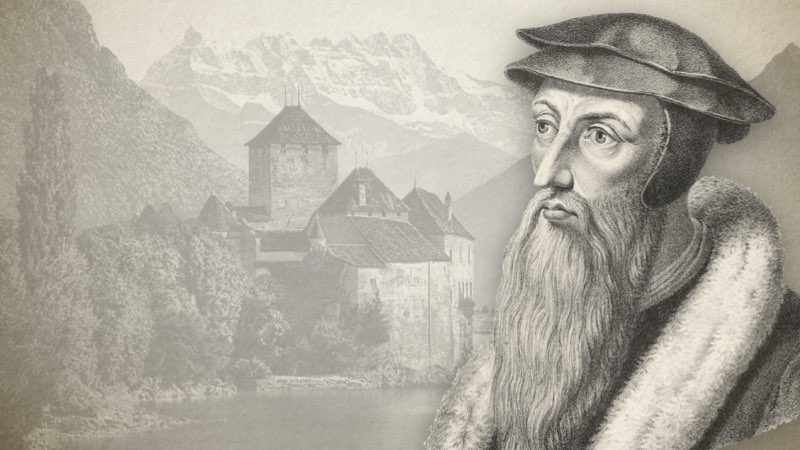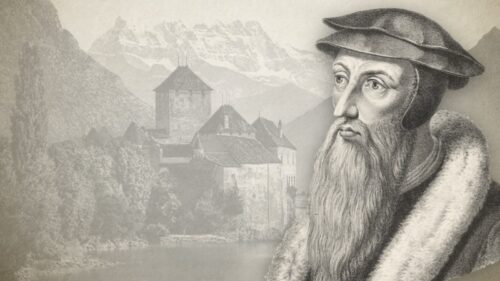John Calvin
John Calvin (1509-1564) was a French pastor, theologian, writer and leading reformer during the Protestant Reformation. His most popular works are his “Institutes Of The Christian Religion” and his commentaries on most books of the Bible. He set forth the absolute sovereignty of God in history and salvation, ascribing all glory to the One with Whom we have to do—the TriUne Jehovah. It is from the teachings of Calvin that the Presbyterian churches emerged. The label which bears his name (“Calvinism”) refers not to all of the teachings he espoused, but rather, to those teachings dealing with the salvation of sinners, otherwise known as the Five Points of Calvinism, or, the Doctrines of Grace.
John Calvin's Institutes Of The Christian Religion, Book 1 (Complete)
John Calvin's Institutes Of The Christian Religion, Book 2 (Complete)
John Calvin's Institutes Of The Christian Religion, Book 3
-
Book 2: Chapter 1, Through The Fall And Revolt Of Adam, The Whole Human Race Made Accursed And Degraded Of Original Sin
I. How necessary the knowledge of ourselves is, its nature, the danger of mistake, its leading parts, sect. 1, 2, 3. II. The causes of Adam’s fearful fall, sect. 4. III. The effects of the fall extending to Adam’s posterity, and all the creatures, sect. 5, to the end of the Chapter, where the nature, propagation, and effect of original sin are considered. Sections. 1. The knowledge of ourselves most necessary. To use it properly we must be divested of pride, and clothed with true humility, which will dispose us to consider our fall, and embrace the mercy of God in Christ. 2. Though there is plausibility in the sentiment which stimulates us to self-admiration, the only sound sentiment is that which inclines us to…
-
Book 2: The Argument, Of The Knowledge Of God The Redeemer, In Christ, As First Manifested To The Fathers, Under The Law, And Thereafter To Us Under The Gospel
The First Part of the Apostles’ Creed—viz. the knowledge of God the Creator, being disposed of, we now come to the Second Part, which relates to the knowledge of God as a Redeemer in Christ. The subjects treated of accordingly are, first, the Occasion of Redemption—viz. Adam’s fall; and, secondly, Redemption itself. The first five chapters are devoted to the former subject, and the remainder to the latter. Under the Occasion of Redemption, the Fall is considered not only in a general way, but also specially in its effects. Hence the first four chapters treat of original sin, free will, the corruption of human nature, and the operation of God in the heart. The fifth chapter contains a refutation of the arguments usually urged in…
-
Title Page And Preface
“Institutes Of The Christian Religion”, John Calvin. Translated From Latin Into English, By Henry Beveridge, Esq. 1845. “Calvinism” is a label used to identify a set of teachings drawn up by the Dutch Reformed Church (DRC) in the year 1619. The teachings were in response to those of a Dutch Theologian named Jacobus Arminius. They are nicknamed Calvinism, because they reflect the doctrines set forth by a French Theologian named John Calvin. In 1536, at the age of twenty-seven, Calvin published a doctrinal body of divinity entitled “Institutes Of The Christian Religion”. The Five Points of Calvinism are based upon the teachings of this work. So much is said about the Five Points of Calvinism, but few have actually read Calvin’s body of divinity. I…
-
Book 1: The Argument, Of The Knowledge Of God The Creator
The First Book treats of the knowledge of God the Creator. But as it is in the creation of man that the divine perfections are best displayed, so man also is made the subject of discourse. Thus the whole book divides itself into two principal heads—the former relating to the knowledge of God, and the latter to the knowledge of man. In the first chapter, these are considered jointly; and in each of the following chapters, separately: occasionally, however, intermingled with other matters which refer to one or other of the heads; e.g., the discussions concerning Scripture and images, falling under the former head, and the other three concerning the creation of the world, the holy angels and devils, falling under the latter. The last…
-
Book 1: Chapter 1, The Knowledge Of God And Of Ourselves Mutually Connected—Nature Of The Connection
Sections. 1. The sum of true wisdom—viz. the knowledge of God and of ourselves. Effects of the latter. 2. Effects of the knowledge of God, in humbling our pride, unveiling our hypocrisy, demonstrating the absolute perfections of God, and our own utter helplessness. 3. Effects of the knowledge of God illustrated by the examples, 1. of holy patriarchs; 2. of holy angels; 3. of the sun and moon. 1. Our wisdom, in so far as it ought to be deemed true and solid Wisdom, consists almost entirely of two parts: the knowledge of God and of ourselves. But as these are connected together by many ties, it is not easy to determine which of the two precedes and gives birth to the other. For, in…
-
Book 1: Chapter 2, What It Is The Know God—Tendency Of This Knowledge
Sections. 1. The knowledge of God the Creator defined. The substance of this knowledge, and the use to be made of it. 2. Further illustration of the use, together with a necessary reproof of vain curiosity, and refutation of the Epicureans. The character of God as it appears to the pious mind, contrasted with the absurd views of the Epicureans. Religion defined. 1. By the knowledge of God, I understand that by which we not only conceive that there is some God, but also apprehend what it is for our interest, and conducive to his glory, what, in short, it is befitting to know concerning him. For, properly speaking, we cannot say that God is known where there is no religion or piety. I am…


